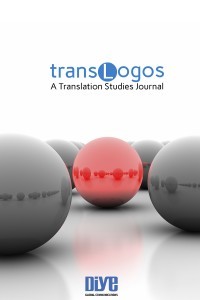The Feasibility of Chinese–English Machine Translation Applied to Academic Texts: Using Thesis Abstracts from National Digital Library of Theses and Dissertations (NDLTD) in Taiwan
Anahtar Kelimeler:
machine translation, Google Translate, academic texts, academic writing, Chinese–English translation
The Feasibility of Chinese–English Machine Translation Applied to Academic Texts: Using Thesis Abstracts from National Digital Library of Theses and Dissertations (NDLTD) in Taiwan
In 2016, Google upgraded its translation system Google Translate (GT) from statistical-based machine translation (SMT) to neural-based machine translation (NMT), the latest machine translation (MT) technology so far, resulting in faster translation speed and higher accuracy. However, according to Angkana Tongpoon-Patanasorn and Karl Griffith (2020), most previous studies focused on statistical-based GT, while few tested the quality of GT’s latest NMT system. This study explores the feasibility of applying GT to Chinese–English academic texts and analyzes whether the English translation produced by GT meets the requirements of English academic writing (AW). The original data used in this study is comprised of Chinese abstracts collected from the website of National Digital Library of Theses and Dissertations in Taiwan. Specifically, twenty most clicked thesis abstracts from each of the five most clicked disciplines, i.e., Engineering, Business and Management, Society and Behavior, Education, and Humanities, are selected, amounting to a total of 100 abstracts. Through a qualitative coding method and content analysis, the results show that three AW features can be found in the English translation output, including this-format, mid-positioning of adverbs, and passive voice. In terms of verb choice, nearly half of the abstracts show use of phrasal verbs, indicating GT’s inability to constantly adopt single-word verbs when translating academic texts from Chinese into English. Also, GT performs best on abstracts from Engineering discipline. By exploring the feasibility of applying GT to Chinese–English academic texts, this study may help contribute to a better understanding of and facilitating use of MT in academic circles.
Keywords:
machine translation, Google Translate, academic texts, academic writing, Chinese–English translation,
___
- Azer, Haniyeh Sadeghi, and Mohammad Bagher Aghayi. 2015. “An Evaluation of Output Quality of Machine Translation (Padideh Software vs. Google Translate).” Advances in Language and Literary Studies 6 (4): 226–237. doi:10.7575/aiac.alls.v.6n.4p.226.
- Bailey, Stephen. 2003. Academic Writing: A Practical Guide for Students. London: RoutledgeFalmer.
- Brown, Peter F., John Cocke, Stephen A. Della Pietra, Vincent J. Della Pietra, Fredrick Jelinek, John D. Lafferty, Robert L. Mercer, and Paul S. Roossin. 1990. “A Statistical Approach to Machine Translation.” Computational Linguistics 16 (2): 79–85. https://aclanthology.org/J90-2002.
- Burchardt, Aljoscha, Arle Lommel, Lindsay Bywood, Kim Harris, and Maja Popović. 2016. “Machine Translation Quality in an Audiovisual Context.” Target 28 (2): 206–221. doi:10.1075/target.28.2.03bur.
- Chen, Ting-An. 2018. Yīnghàn bǐjiào yǔ fānyì (zuìxīn bǎn) [English and Chinese translation: A comparative study (New edition)]. Taipei: Bookman Books.
- Chiang, David. 2005. “A Hierarchical Phrase-Based Model for Statistical Machine Translation.” In Proceedings of the 43rd Annual Meeting of the Association for Computational Linguistics, 263–270. doi:10.3115/1219840.1219873.
- D’Angelo, Larissa. 2016. “The Academic Poster Genre: Friend or Foe?” In The Routledge Handbook of English for Academic Purposes, edited by Ken Hyland and Philip Shaw, 392–402. London: Routledge.
- Groves, Michael, and Klaus Mundt. 2015. “Friend or Foe? Google Translate in Language for Academic Purposes.” English for Specific Purposes 37:112–121. doi:10.1016/j.esp.2014.09.001.
- Kao, Hsiao-Ting. 2011. “Training in Pre-MT Editing with the Controlled Language: A Pilot Study.” Master’s thesis, National Kaohsiung First University of Science and Technology.
- Klimova, Blanka Frydrychova. 2013. “Common Mistakes in Writing Abstracts in English.” Procedia - Social and Behavioral Sciences 93:512–516. doi:10.1016/j.sbspro.2013.09.230.
- O’Halloran, Kay L., Sabine Tan, and Bradley A. Smith. 2016. “Multimodal Approaches to English for Academic Purposes.” In The Routledge Handbook of English for Academic Purposes, edited by Ken Hyland and Philip Shaw, 256–269. London: Routledge.
- Sijia, Dong, and Hong Jie. 2015. “An Analysis of Problems in Writing Research Paper English Abstracts.” Journal of Language and Literature Studies, no. 5, 146–147, 163. https://www.cnki.com.cn/Article/CJFDTotal-YWWY201505060.htm.
- Swales, John M., and Christine B. Feak. 2012. Academic Writing for Graduate Students: Essential Tasks and Skills. 3rd ed. Michigan: University of Michigan Press.
- Tongpoon-Patanasorn, Angkana, and Karl Griffith. 2020. “Google Translate and Translation Quality: A Case of Translating Academic Abstracts from Thai to English.” PASAA: Journal of Language Teaching and Learning in Thailand 60:134–163. https://files.eric.ed.gov/fulltext/EJ1259132.pdf.
- Tsai, Po-Ying. 2014. Cóng zìjù dào jiégòu: Xuéshù lùnwén xiězuò zhǐyǐn (dì èr bǎn) [A structural guide to academic writing (Second edition)]. Taipei: National Taiwan University Press.
- Yang, Ding-Hua. 2018. “A Comparative Study of Strategic Differences in Chinese-English Bidirectional Post-MT Editing: Use of 3C User Manual as Samples.” Master’s thesis, National Kaohsiung University of Science and Technology.
- Ye, Zinan, and Lynette Xiaojing Shi. 2014. Introduction to Chinese-English Translation. Taipei: Bookman Books.
- Yu, Mu-Yen. 2019. “Cóng gōng néng fān yì lǐ lùn tàn tǎo jī qì fān yì zài yī xué wén tǐ dē shí yòng xìng- Yǐ Wéi Jī Bǎi Kē Yī Xué Fān Yì Jì Huà wéi lì.” [Exploring the practicality of machine translation in medical articles from the perspective of functional theories of translation: A case study on WikiProject Medicine.] Master’s thesis, Wenzao Ursuline University of Language.
- Zhang, Xiao-Rei. 2014. “Lùn tǐ yù lèi lùn wén yīng wén zhāi yào dē xiě zuò.” [On writing of English abstract of sports papers.] Journal of Guangxi Normal University for Nationalities 31 (3): 62–64. doi:10.3969/j.issn.1674-8891.2014.03.019.
- Zhong, Guo Xiang. 2016. “Kē jì qí kān yīng wén zhāi yào dē xiě zuò jì qiǎo tàn suǒ.” [Writing techniques in English abstracts of scientific and technical journals.] Journal of Minnan Normal University (Natural Science) 29 (2): 124–126. doi:10.3969/j.issn.1008-7826.2016.02.021.
- Yayın Aralığı: Yılda 2 Sayı
- Başlangıç: 2018
- Yayıncı: Diye Yayınları
Sayıdaki Diğer Makaleler
Agency in Structure: An Inquiry into Gideon Toury’s Target-Oriented Perspective
The Quality of Culture-Specific Items’ Translation in Rob Marshall’s Film Memoirs of a Geisha
Aslı KALEM BAKKAL, Nilüfer ALİMEN
Sui HE, Mark SHUTTLEWORTH, Caiwen WANG
Revisiting Self-Translation and Indirect Translation in Intralingual Context
